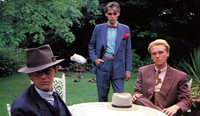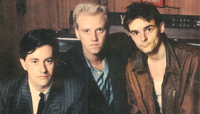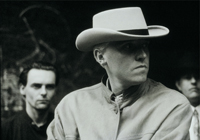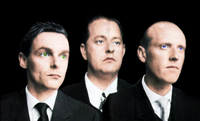|
|
| |
 Biography:
»
Heaven 17:
Biography:
»
Heaven 17:
|
 |
|
Taking their name from a fictional pop group mentioned in Anthony
Burgess's novel A Clockwork Orange (where 'The Heaven Seventeen' are
at number 4 in the charts with "Inside"), Heaven 17 formed when Ian
Craig Marsh and Martyn Ware split from their earlier group The Human
League and formed production company British Electric Foundation (BEF).
Shortly after, they recruited their friend and photographer Glenn
Gregory on vocals to complete their lineup for Heaven 17; the
group's friend Malcolm Veale often featured on tracks playing
saxophone or synthesiser. Contrary to popular belief, they were not
New Romantics and shared few visual characteristics with groups such
as Spandau Ballet and Culture Club. |
|
 |
|
|
|
|
|
Like The Human League, Heaven 17 heavily used synthesizers and drum
machines, the Linn LM-1 programmed by Ware particularly contributing
to their signature sound. They had some minor hits including the
early "Play To Win", featured on the album Penthouse and Pavement.
Their debut single "(We Don't Need This) Fascist Groove Thang" from
the same album had attracted some attention, becoming a left-wing
anthem for a while, and was banned by the BBC because of its overtly
political lyrics, though it still reached #45 in the UK singles
chart. |
|
 |
|
|
|
|
Major chart success eluded them until the single "Temptation" (on
which they were augmented by vocalist Carol Kenyon) reached #2 in
the UK charts in summer 1983. Other songs from the same album, The
Luxury Gap, charted although not as high - "Come Live With Me"
reached #5 in the UK, "Crushed By The Wheels of Industry" number 17,
and "Let Me Go", #41 in November 1982. The album itself charted at
#4, their best ever position.
At the end of 1983, the band (under their BEF guise) helped launch
Tina Turner's solo career, producing and providing backing vocals on
her debut hit "Let's Stay Together". 1984 saw the release of the
moderately successful How Men Are, which reached#12.
The band also worked on the Band Aid single at the end of 1984, with
Gregory supplying vocals alongside Midge Ure and Sting after a
personal request from Ure that he attend. However, they did not
perform at Live Aid the following year. |
|

 |
|
|
|
|
Pleasure One (featuring the single "Trouble" - a minor hit in the UK
at #51, but a big success in Germany where it reached #17) appeared
in 1986 and was followed up in 1988 with Teddy Bear, Duke & Psycho (featuring
the single "Train of Love in Motion"), although these two albums
were poorly received and had little commercial success. The early
1990s were a quiet period for the band and they would not work
together as Heaven 17 again until 1996's Bigger Than America. In the
preceding years, Marsh and Ware produced a second BEF album to
follow 1982's original Music of Quality and Distinction and Gregory
formed the band Ugly. Ware became an in-demand producer, working for
the likes of Terence Trent D'Arby, Alison Moyet and Erasure.
2005 saw the release of the long-awaited Before After, which had a
much more contemporary dance sound compared to previous albums. A CD
of remixes of "Hands Up To Heaven" from the album hit number 6 on
the Billboard Magazine US Club Play Chart in May 2006. In October
the same year Virgin issued a greatest hits compilation called Sight
and Sound, which included a previously-unheard version of "Temptation"
with spoken vocals by an unknown student from Germany whom the band
met in 1982. It had been discovered on 1-inch tape by Glenn
Gregory's mother and remastered by Simon Heyworth.

Text from
Wikipedia. |
 |
 |
|
 top top |
|
 Copyright © 2007
www.humanleague.dk Copyright © 2007
www.humanleague.dk |
|